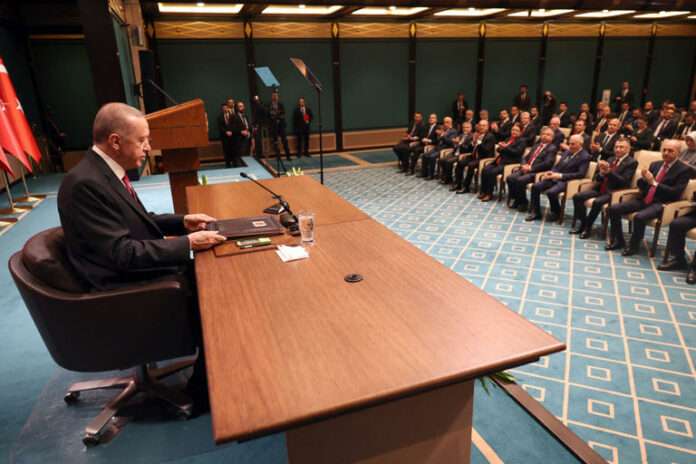Story by Gordon G. Chang • Yesterday 12:30 PM

Turkey, under intense pressure from both the United States and the European Union, this month “abruptly” began to block the transit of sanctioned goods to Russia. This welcome development follows reports that Brian Nelson, the U.S. Treasury’s top sanctions official, met with Turkish counterparts last month in Ankara and Istanbul.

Previously, Turkey had aided the Russian war effort by allowing Moscow to use it as a conduit for the flow of goods. Turkish companies had even sold, in violation of U.S. sanctions, products to Russian companies.
There is, unfortunately, no good news on a more consequential front. Ankara is still blocking the admission of Finland and Sweden to NATO. Both Scandinavian countries, long neutral, applied for membership soon after Russia’s invasion of Ukraine last February.
At a meeting last week at NATO headquarters in Brussels, representatives of the two candidates for membership met with Turkish officials for the first time since November. No agreement was reached and there were, according to Politico, no signs of progress although there was a consensus on holding further meetings.
Turkey has been an obstacle from the beginning. At the heart of the dispute—at least ostensibly—is Turkey’s insistence that the two countries stop harboring groups Ankara considers terrorists. At a NATO meeting in late June of last year, the three countries signed the “Trilateral Memorandum,” which listed actions the two membership candidates would take to meet Turkey’s concerns. For its part, Ankara agreed to support Finland’s and Sweden’s membership in the alliance.
“After the celebration of NATO unity in Madrid, it didn’t take long for cracks to appear,” noted Theresa Fallon, director of the Brussels-based Center for Russia Europe Asia Studies, to Newsweek. “Before the Swedish and Finnish defense ministers had touched down on their respective runways, they had received word that the Turkish government was still an obstacle.”
Turkey, Fallon points out, keeps raising new objections. “Ankara,” she reports, “demanded over 70 extraditions from Stockholm after Turkey originally agreed to support Sweden’s bid for NATO membership.”
“It is unclear exactly what Turkey seeks,” writes Politico. “There is speculation within the alliance that the drawn-out process is in part due to President Recep Tayyip Erdogan’s domestic political considerations.”
All eyes are now on Turkey’s May 14 general election. Erdogan faces stiff opposition, and many think he would lose in a fair contest, especially because of discontent over botched relief efforts after last month’s devastating 7.8 magnitude earthquake in the southern and central parts of the country.
As a practical matter, there will be no progress on the enlargement of NATO until the vote. As Gregory Copley, president of the International Strategic Studies Association, tells Newsweek, “Erdogan is desperately attempting to show that he is the decisive figure in NATO, not only to gain leverage in the other NATO states but also to show his domestic audience that he is a world leader.”
There is, therefore, little anyone can do to speed up Finn and Swedish membership before May 14.
There are bigger problems, however. Copley adds that “Erdogan now has very little ability to resist Moscow and Beijing.”
China has been continually supplying needed infrastructure and other investment, effectively bailing out Erdogan, who like other autocrats has consistently mismanaged his economy.
Turkey’s president also needs Moscow. As the New York Times reported in December, “Turkey has deepened its energy ties to Russia” with imports of crude oil, diesel fuel, and coal. “Russian oil is increasingly being routed through Turkey,” the paper notes. Erdogan will not stop bedeviling his NATO partners as long as he relies on Vladimir Putin‘s energy lifeline.
So what can be done? Jonathan Bass of InfraGolbal Partners, an energy consultant working for Turkish parties, tells Newsweek that Ankara’s Black Sea gas fields should start production this year but the country also needs a gas pipeline from Israel. Israeli Prime Minister Benjamin Netanyahu is now considering whether to greenlight the project. Anything Washington can do to lessen Ankara’s dependence on Russian energy will ultimately help woo Erdogan away from Putin.
Since the beginning of the war last year, Erdogan has been generally successful in performing his “delicate balancing act” with Russia and China on one side and NATO and Ukraine on the other. There are signs, however, that his maneuvering, which has greatly aided Putin, is “increasingly untenable.”
It’s about time for Washington to apply even more pressure to force Erdogan to choose. The Turkish president can be persuaded. He was, for instance, forced to drop plans to deploy an S-400 surface-to-air missile system that he received from Russia’s Rosoboronexport in 2019—the missiles and associated equipment are now in storage in Turkey—and was pressured into not buying a second batch of S-400s.
Erdogan remains, at best, a difficult friend. And perhaps an untrustworthy one. Senator Chris Van Hollen (D-Md.) echoed the views of many when he said in early February that Turkey is an “unfaithful ally.”
“Loyalty runs both ways,” Bass says, referring to decades of a troubled relationship, including the EU‘s rejection of Turkey’s membership. “Perhaps the West has not been faithful to Turkey.”
Perhaps, but something has to change.
Gordon G. Chang is the author of The Coming Collapse of China. Follow him on Twitter @GordonGChang.
The views expressed in this article are the writer’s own.





